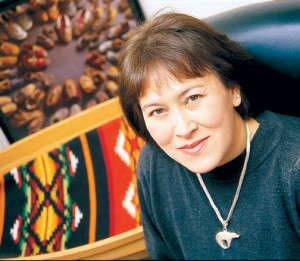The Native American health disparities expert, surgeon and UA College of Medicine – Tucson student affairs/admissions leader has been proposed for consideration for the post by tribal advocacy organizations.
July17, 2013
TUCSON, Ariz. – Lori Alvord, MD, associate dean for student affairs and admission at the University of Arizona College of Medicine – Tucson, has been proposed as one of four candidates for Surgeon General of the United States by the National Indian Health Board and the National Congress of American Indians. Dr. Alvord also serves as associate faculty at Johns Hopkins Bloomberg School of Public Health, Center for American Indian Health.
A board-certified general surgeon, Dr. Alvord is a member of the Diné (Navajo) Tribe and of the Tsinnajinnié (Ponderosa Pine) and Ashi’hii’ Diné (Salt People) clans, and is the first Navajo woman to become a surgeon.
The National Indian Health Board (NIHB) and the National Congress of American Indians (NCAI) are not-for-profit tribal advocacy organizations. In addition to endorsing Dr. Alvord, the organizations endorsed Donald Warne, MD, MPH (Oglala Lakota), Charles Grim, DDS (Cherokee) and Rear Admiral Craig Vanderwagon, MD.
“Serving as surgeon general of the United States should be an individual with the capacity to speak and act with authority, care and compassion on behalf of the health of all Americans regarding the health of all of our people. The position requires an individual with a long-term vision for a healthy America. The next surgeon general should be selected from among the finest physicians, medical academicians and health leaders in the country, including Indian Country,” said the joint statement released by the NIHB.
The surgeon general is appointed for a four-year term by the president of the United States, with the advice and consent of the U.S. Senate. Regina M. Benjamin, MD, MBA, is the 18th Surgeon General of the United States and was appointed in October 2009.
Richard Carmona MD, MPH, FACS, was the 17th Surgeon General of the United States. He is Distinguished Professor of Public Health at the UA Mel and Enid Zuckerman College of Public Health and holds faculty appointments as a UA professor of surgery and pharmacy. He is president of the Canyon Ranch Institute Board of Directors and vice chairman of Canyon Ranch.
—
About Dr. Alvord
Raised in Crownpoint, N.M., Dr. Alvord received her undergraduate degree from Dartmouth College in Hanover, N.H., and her doctor of medicine degree from Stanford University School of Medicine in Stanford, Calif. She completed a residency in general surgery at Stanford University Hospital. Her research has focused on surgical outcomes and health disparities in Native American populations.
She has served on the National Institutes of Health (NIH) study sections reviewing grant applications for Native American Research Centers for Health (NARCH) and the NIH National Advisory Council for the National Center for Alternative and Complementary Medicine (NCCAM).
Dr. Alvord is the author of “The Scalpel and the Silver Bear” (1999), a memoir that describes her journey from the Navajo reservation to become a surgeon, her efforts to provide culturally competent care and to create healing environments based on the principles of Navajo traditional healing. Dr. Alvord’s book is used in many university courses on Native American health and culture, and she works regularly with Native American student groups to mentor and encourage students to pursue higher education and health careers.
Dr. Alvord began her role as associate dean for student affairs and admission at the UA College of Medicine – Tucson in September 2012 and has responsibility for the offices of student affairs, admissions, financial aid, student records, academic counseling and the Medical Student Research Program. Dr. Alvord served in the same position at Dartmouth Medical School from 1997-2009.
About the National Indian Health Board
The NIHB provides health care advocacy services, facilitates tribal budget consultation and provides timely information and other services to all tribal governments. The NIHB presents the tribal perspective while monitoring federal legislation, and opening opportunities to network with other national health care organizations to engage their support on Indian health-care issues.
About the National Congress of American Indians
The NCAI, founded in 1944, is the oldest, largest and most representative American Indian and Alaska Native organization serving the broad interests of tribal governments and communities. NCAI’s mission is to protect and enhance treaty and sovereign rights, to secure traditional laws, cultures and ways of life for Native descendants, to promote a common understanding of the rightful place of tribes in the family of American governments and to improve the quality of life for Native communities and peoples.
#
Contact: The University of Arizona
Rebecca Ruiz McGill, 520-360-0308

